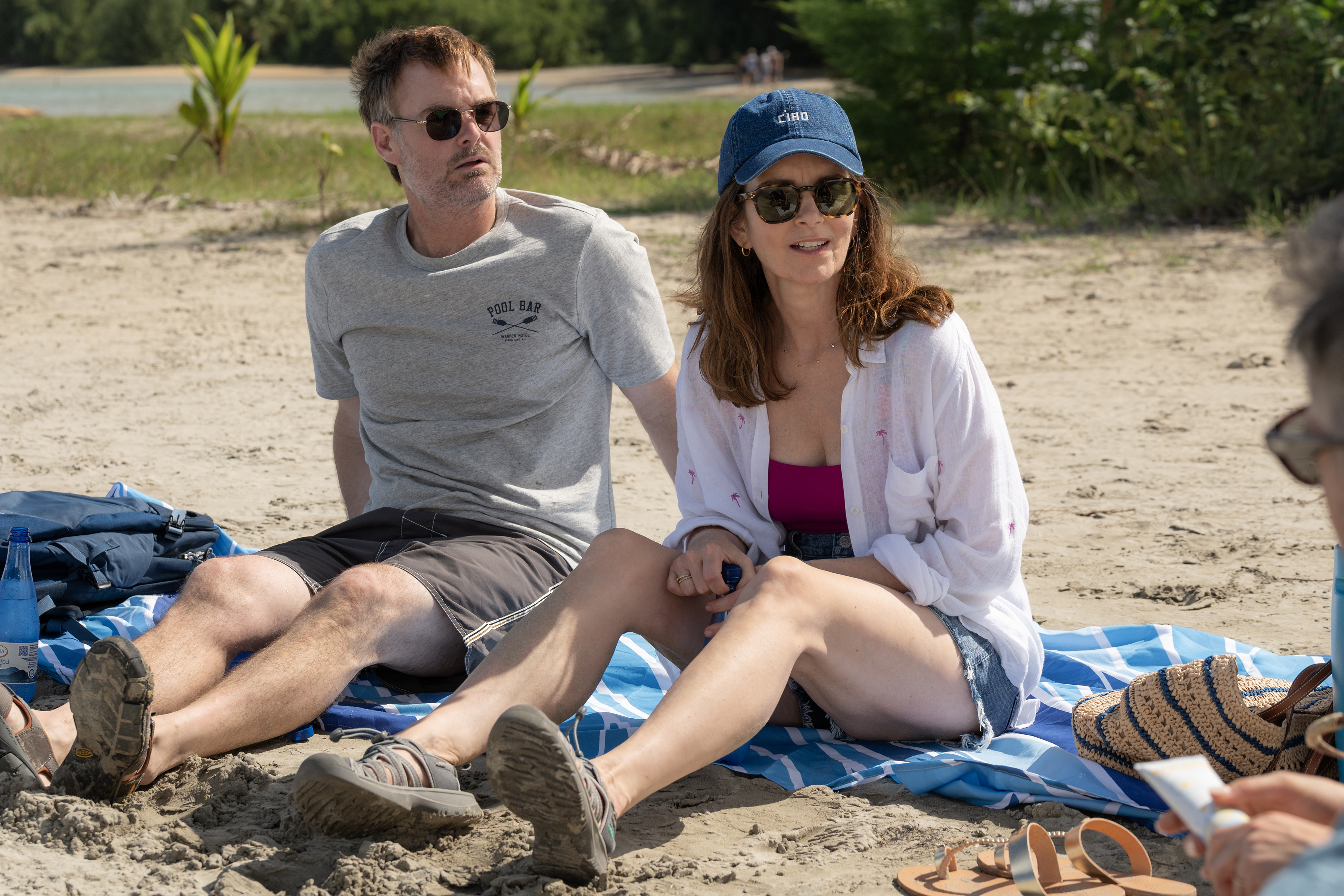Tina Fey Is a Marriage Realist

There’s an exchange in the new miniseries The Four Seasons that will land with a lot of long-married women. Tina Fey’s Kate and her husband Jack, who’s played by Will Forte, are running late for an obligation, and Jack mentions that he hasn’t eaten all day. An exasperated Kate observes under her breath how nice it would be to be married to an adult who could meet his own needs. It’s a very small moment, but it captures the mood of a lot of women in the have-it-all era: will the caretaking never end?
[time-brightcove not-tgx=”true”]Much of Fey’s post-SNL acting career has been built on playing or creating a version of 30 Rock’s Liz Lemon, the only sane person in the room. In Mean Girls, she was the voice of reason in the nutty world of high school cliques. In Baby Mama, she’s the by-the-book responsible mother-to-be opposite Amy Poehler’s out-of-control surrogate. And in The Four Seasons, she’s a marriage myth buster, seeking to take her friends’ romantic notions about long-term unions down a notch.
In one early scene, for example, she dispenses with the romantic idea that they’ve each found their soulmates. “You really believe that there is one person for every person on earth that they’re supposed to be with?” she asks. “And then that person also happens to be at the same dorm at college?” Her friends are incredulous. “Who,” asks Steve Carell’s character Nick, “invited the incel?” Soulmates are a foundational idea in our romantic landscapes, but her logic is irrefutable.
In the show, which started streaming on Netflix about a week before Mother’s Day, three sets of couple friends go on four trips together. Each trip is in a different season, but as far as married life goes, they are all in the same one, looking at spending the rest of their lives with a person of zero novelty value. Fey lays out a number of ways to deal with this predicament. In the first episode, which takes place during spring, the richest of the husbands—played by Carell, whose likability can reliably withstand ignoble behavior—reveals he’s going to leave his wife of 25 years (Kerri Kenney). His unhappiness is of the usual affluent 21st-century type. Now that the nest is empty he craves adventure, while the only ground his wife seems to want to break is on Farmville.
The divorce sends a shockwave through the relationships of the other couples—a known effect in marriage scholarship—and as the friends move through their summer, fall, and winter trips, there’s a lot of reckoning to do. The miniseries is based on a 1981 movie of the same name written and directed by and starring Alan Alda. In that version, Alda’s character, a therapist, is the emotional center, always trying to be the better person. In the update, written by Fey, Lang Fisher, and Tracey Wigfeld, the role is carried by Fey’s character, whose commitment to doing the right thing frequently turns her into something of a fun-sponge.
Fey picked an interesting time to draw a bead on long-term mating habits. The annual divorce rate has dropped by about a third since the first Four Seasons came out. The marriage rate has dropped too, but not among the kinds of college-educated folks who populate both these entertainment offerings. Two people of the same sex can marry (the couple in this version is played by Colman Domingo and Marco Calvani), and most recently there has been a rising interest in ethical non-monogamy, relationships in which people have consensual extramarital partners.
Kate dispenses with the last so-called innovation pretty quickly. “Puke. Disgusting,” she says to her best buddy, played by Domingo, of the suggestion she might take a lover. “I’m not out here looking to see a new set of thickening toenails.” She also pokes fun at the classic rich-guy habit of finding a 2.0 version of the first wife. When Nick brings his girlfriend on one of their vacations, and the bright light of their new relationship energy throws some shade on the established couples’ predictable habits, Nick accuses his friends of being weird. Kate bristles at the idea that spouses can be so easily slotted in and out of everybody’s lives. “It’s weird that Anne’s not here,” she says. “And it’s weird your girlfriend wasn’t born when Reagan got shot.”
More broadly, it seems that Fey and her writers are examining what the point of marriage is anymore, especially for women, who now initiate most divorces. Many of the magnetic forces that drew people to get married—sex, children, financial security, respectability—have weakened, because those things are readily available to single people. Married people, by and large, still report that they are happier than single people, unless they’re older women. Most first marriages survive, but it’s not a big majority—about 59%. And the only age group where the divorce rate didn’t decline is 50-plus, the empty nesters who populate this show. Fey and her team go to some pains to present both parties in the divorce with some empathy. Nobody gets written out of the plot because their marriage didn’t last.
Of course, there are things about long-term relationships that haven’t changed in the 44 years since the first Four Seasons came out, or the 302 years since Vivaldi wrote the concerti, or even since the four distinct seasons were identified. Married couples still get on each other’s last nerve, often by doing the thing that drew each of them together. A comforting stability can feel like inertia. A gentle partner can look like a useless pushover. Being nurtured can feel like being smothered. Also, nobody ever wants to go to couples’ therapy. And everybody always wants more sex, theoretically, but can’t quite put the pieces together to make it happen.
Fey herself has been married for almost quarter of a century and been in a relationship with her husband, Jeff Richmond, for more than half her life. When they met, “I had short hair with a perm on top, and I would wear oversized denim shorts overalls,” she said in a 2010 speech. “And that is how I know our love is real.” Fey’s character Kate also touts longevity as a virtue beyond physical attraction. It will come as no surprise to fans of any form of romantic comedy that her insistence that marriage failure is really character failure blows up in her face.
Ultimately, however, the series ends on a hopeful note. Marriage may be like learning to play violin—a seemingly endless slog of repetition and mistakes and a willingness to turn down activities that look more fun—but it’s worth it. And not just because a violin can’t leave you. Long-married couples still pine for that spark of early romance, but they don’t really want to go back. “When you’re young and in love, it’s beyond your control,” says Domingo’s character, in what feels like the series’ working thesis. “What we have now is a result of knowledge and experience. We have chosen each other.” In other words, you probably won’t find a soulmate, but you may become one.



